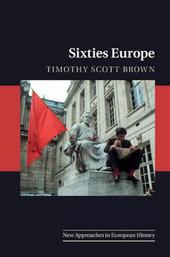
|
Sixties Europe
Paperback / softback
Main Details
| Title |
Sixties Europe
|
| Authors and Contributors |
By (author) Timothy Scott Brown
|
| Series | New Approaches to European History |
|---|
| Physical Properties |
| Format:Paperback / softback | | Pages:250 | | Dimensions(mm): Height 228,Width 152 |
|
| ISBN/Barcode |
9781107552906
|
| Classifications | Dewey:940.556 |
|---|
| Audience | | Tertiary Education (US: College) | | Professional & Vocational | |
|---|
|
Publishing Details |
| Publisher |
Cambridge University Press
|
| Imprint |
Cambridge University Press
|
| Publication Date |
6 August 2020 |
| Publication Country |
United Kingdom
|
Description
Sixties Europe examines the border-crossing uprisings of the 1960s in Europe on both sides of the Cold War divide. Placing European developments within a global context formed by Third World liberation struggles and Cold War geopolitics, Timothy Scott Brown highlights the importance of transnational exchanges across bloc boundaries. New Left ideas and cultural practices easily crossed bloc boundaries, but Brown demonstrates that the 1960s in Europe did not simply unfold according to a normative western model. Everywhere, innovations in the arts and popular culture synergized radical politics as advocates of workers' democracy emerged to pursue longstanding demands predating the Cold War divide. Tracing the development of a distinctive blend of cultural and political activism across diverse national settings, Sixties Europe examines an important, historically-recent attempt to address unresolved questions about human social organization that remain relevant in the present, and it offers an original history of Europe across a transformative decade.
Author Biography
Timothy Scott Brown is Professor and Chair of History at Northeastern University and Senior Fellow at the Institute for European Studies at the University of California, Berkeley. He is a historian of twentieth-century transnational social movements. A two-time Fulbright Recipient, he is winner of the 2016 Berlin Prize of the American Academy in Berlin and a 2016-17 Fellow of the American Council of Learned Societies. His books include West Germany in the Global Sixties: The Anti-Authoritarian Revolt, 1962-1978 (2013), Weimar Radicals: Nazis and Communists between Authenticity and Performance (2009) and The Global Sixties in Sound and Vision: Media, Counterculture, Revolt (2014) with Andrew Lison.
Reviews'This ambitious study will find its place on every 1960s reading list. Impressive in breadth and detail, it foregrounds the creative, radical and globally connected reinventions of social power and progressive politics. The narrative interweaves the legacy of past rebellions, the centrality of Third World Liberation to European debates, and the continued relevance of class mobilisation. A major contribution to scholarship and a fascinating read.' Maud Bracke, University of Glasgow 'The best short book on 1968 that I have read. Brown's highly engaging account does justice to the variety of Europe's many '1968s' while courageously proposing to grasp that era as a whole. Situating 1968 within deeper histories of radical agitation and inviting new appreciation for the relevance of 1968 in our own time, he pinpoints tensions that have long-haunted emancipatory politics: between culture and politics, anti-authoritarianism and organization, and the individual and the collective. Sixties Europe will substantively mark the field and serve as a tremendous resource for undergraduate and postgraduate classrooms.' Julian Bourg, Boston College 'A commanding and absorbing study of extraordinary range for the scholar and general public alike. Casting his eye across time as well as space, Brown elucidates deep complexities alongside commonalities, as he moves across the widest range of popular politics, to explore dreams - and outcomes. A remarkable achievement.' Belinda Davis, Rutgers University 'Brown provides an important analysis of the conceptual underpinnings of the revolutionary movements of the 1960s in Europe. This is very much a book of ideas, which rightly argues that the many movements on the left which blossomed in countries across the continent placed a search for meaning at the heart of their efforts.' Nick Thomas, University of Nottingham
|